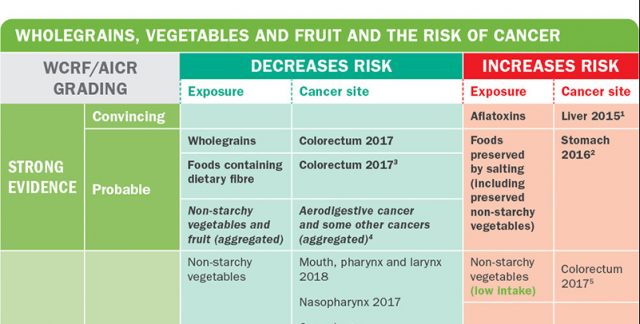You know fiber is good for you. You also may have heard that eating fiber-filled foods can help with weight management. Now comes a systematic analysis of the research that suggests eating plenty of beans, Brussels sprouts and other plant foods with a specific type of fiber may help you lose weight, whether or not you cut calories.
The study, published in the American Journal of Clinical Nutrition, adds insights into the existing body of evidence on fiber and weight control.

AICR research has found that eating foods containing fiber – no specific type – is part of an eating approach that protects against unwanted weight gain. That is important because having excess body fat increases the risk of at least 12 cancers, including post-menopausal breast, colorectal and esophageal. The strongest evidence to decrease the risk of weight gain or having overweight, according to the AICR report, shows that you should combine a diet high in fiber alongside other healthy habits, including being active and a Mediterranean-type diet.
Viscous, soluble fiber and weight research
Fiber is a type of carbohydrate found in plant foods and there are two basic types, separated by how they react with water. Insoluble fiber does not dissolve in water; soluble fiber does. Both provide health benefits but it’s the soluble fiber – often called viscous fiber – that is the focus of weight research. When viscous fiber mixes with water in our body it become a gel-like consistency and slows down digestion. That can help people feel full longer, which can help people eat less.
Most plant foods contain some of each type, some leaning higher towards a specific type.
For this study, researchers looked at the effects of viscous fiber on weight by analyzing the randomized controlled trials (RCTs) on the topic. RCTs are considered one of the strongest types of studies, comparing two groups of people that are randomly assigned to the group. The main difference between the two groups is the subject of the study.
In this case, one group of people was taking a viscous fiber supplement and being compared to a set of people eating about the same number of calories and not taking the same supplement. (In some studies, they took an inactive or another supplement.) Both groups ate their typical diet and all the studies lasted at least four weeks.
After pooling data from 62 studies, the researchers concluded that taking close to 7 grams of viscous fiber led to an ever-so-slight decrease in body weight and waist circumference. After an average of 10 weeks, people taking the supplement weighed about three-quarters of a pound less and had a quarter of an inch smaller waist compared to the group not taking the supplement.
There were no changes in body fat. Greater reductions in body weight were seen in people having overweight and diabetes.
As the authors note, the effect is modest and would not apply to an individual level. Longer, high-quality trials are needed, the study concludes.
Fiber and our microbes
An accompanying editorial in the same issue of AJCN argues that future research relating to fiber and body weight should focus on better understanding how fiber affects a person’s gut bacteria.
Our gut, and entire bodies, teems with microbes that are important for good health. Research suggests that the health-promoting microbes in our gut feast on dietary fiber. As each person has a unique collection of microbes, the editorial authors point out, a deeper understanding of the fiber-microbe interaction may help to better identify individuals who respond particularly well to certain fiber diets or supplements.
Fiber of all types for health, eat more of it
The AJCN analysis comes after a 2019 analysis of the evidence found that consuming dietary fiber and whole grains from different sources lowered body weight by about the same amount, along with lowering risk of several chronic diseases.
As the research continues, what is clear now is the many health benefits of eating fiber-filled foods, regardless of weight control. Fiber can help control spikes in blood sugar and healthy cholesterol levels. AICR research shows that eating foods containing fiber is one of the ways to protect against colorectal cancer.
If you’re like the average American, there’s a good chance you’re not getting enough of this nutrient. The recommended daily goal for a 2, 000 calorie daily diet is 25 grams. AICR recommends at least 30 grams of dietary fiber daily as part of a healthy eating pattern to lower cancer risk. To put that in context, a slice of whole wheat bread has 2 grams; a cup of instant cooked oatmeal has 5 grams, a medium orange or banana have about 3 grams and a cup of green peas has 8 grams.
Dietary fiber is considered a “nutrient of public health concern” because low intakes are associated with potential health risks.
Even small increases of fiber can help protect your health. The AICR report on colorectal cancer shows that each 10-grams increase in dietary fiber lowers risk of colorectal cancer by 7 percent.
For strategies to incorporate more fiber, along with other healthy foods, into your day, visit AICR’s section on Healthy Eating.
The AJCN study was supported by the King Abdullah Scholarship Program, Saudi Arabia, PSI Graham Farquharson Knowledge Translation Fellowship, Diabetes Canada Clinician Scientist Award, and Banting & Best Diabetes Centre Sun Life Financial New Investigator Award.





